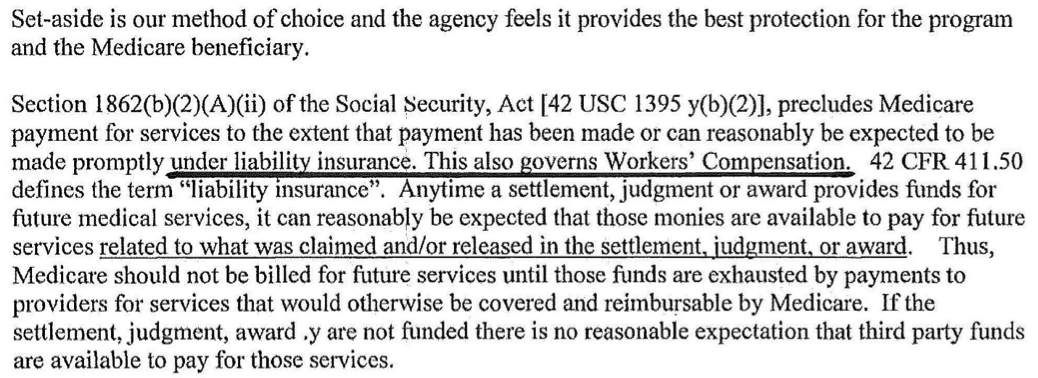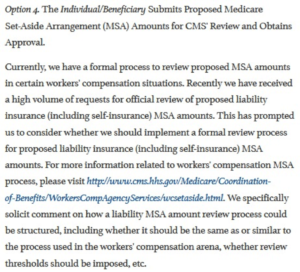Medicare eligible. It seems that when a defendant hears these words, CMS automatically places a target on your client’s back and aims for the bullseye. We have seen this happen year in and year out. That is why we crafted the ability to provide attorneys with holistic Medicare Set-Aside solutions.
The label of being “medicare eligible” can lead to many un-truths. For example, defendants may claim that your client must create an MSA. Un-true. And this one: that defendants won’t be able to settle your case until they have proof that Centers for Medicare and Medicaid Services (CMS) has approved your client’s MSA. Un-true. Or, that you must obtain a CMS letter stating that an MSA is not required in your client’s case. Un-true, and not even possible. If any of this sounds familiar, it’s because defendants have been telling you un-truths about Medicare Set-Aside (MSA) arrangements for years.
The truth is that there is no legal requirement for MSAs at all in liability personal injury cases. CMS is not approving liability MSAs. Also, CMS will not provide a letter stating that an MSA is not required in a specific case. In fact, MSAs are entirely voluntary. A conclusion that arose again as a result of the Aranki vs. Burwell case. Yet, this outcome doesn’t mean that MSAs should be ignored. No. Far from it. That is why we have tirelessly sought to provide Medicare Set-Aside solutions that address these untruths to help your client make an informed decision. Part of making an informed decision is knowing the history of MSAs, and understanding why MSAs should not be ignored.
The History Behind Medicare Set-Aside Solutions
The Aranki vs. Burwell case evolved from a medical malpractice case that started in 2009 in Arizona. While a settlement had been reached, the defendants were still concerned about its finality due to the uncertainty of the MSA question. A lot was unknown about MSAs back then, and the defendants thought they would be liable without a court decision on its necessity. They demanded that the plaintiffs supply them with a letter from CMS stating whether or not the client was required to set up an MSA. With no immediate answer, the settlement was held up for three years. That is until a federal judge issued a pronouncement.
The judge stated that no federal law or CMS regulation requires the creation of an MSA in a personal injury settlement. It gets better. This judge was also asked to rule on forcing CMS to issue a letter as to whether or not this client needs an MSA. The ultimate finding being that there’s no federal law that requires it [CMS to issue a letter], so the court doesn’t see any standing here to even comment. No MSA required meant case closed, and this decision has acted as the ruling going forward. Yet, recent events indicate that a change could be coming soon.
Recent Developments
More critical insight is available in the 2011 Stalcup memo. A memo by Sally Stalcup, Regional Director of Region 6 for Medicare and CMS in Dallas. Her memo states that we must protect Medicare trust funds from payment for future service. Regardless of whether it’s Worker’s Comp. or liability. Surrounding language indicates that while CMS does not mandate a specific mechanism to protect those interests, and the law does not require a set-aside in any situation, that an MSA is the preferred method. Also of note is that any time plaintiffs can expect settlement funds to pay for future services, they can’t bill Medicare for future medical services until the exhaustion of these funds. Exact text is below:


After this memo, a clamor for guidance followed. With that, came an advance notice of proposed rulemaking. Issued on June 15, 2012. This advance notice, addressing liability cases, includes seven different options. All of them for handling the Liability Medicare Set-Aside issue. Especially alarming is option number four, below. It requires submitting a proposed MSA to CMS for review and approval.

Fast forward two years later to October 8, 2014. CMS withdrew The Project for Public Guidance. This advance notice was part of that project. Yet, expectations that CMS will resubmit at some point in the future still loom large. Added to these is another concern. Earlier, CMS published an update to a pre-solicitation for a workers compensation review contractor. It states that a Statement of Work (SOW) update will include the processing of Non-Group Health Plan (NGHP) Medicare Set-Aside arrangements. The anticipated award date? November 7, 2016.

All of these are signs that the U.S. Government has pivoted. Also, that they are looking once again at Medicare Set-Aside arrangements in liability personal injury cases.
What Comes Next?
Meanwhile, it’s important to decide whether, and which, Medicare Set-Aside solution is right for your client. That depends on their unique facts and circumstances. Also, whether they are a do-it-yourself or a do-it-for-you type. The law requires that we protect Medicare Trust Funds from payment for future services. That is true whether it is a Worker’s Compensation or Liability case. There is no distinction in the law. But how exactly will your client comply with the law? The old pick a number out of the air? Or a professional MSA Allocation Study? Then, next question, self-administer, or professionally administered? If they go the do-it-yourself route, can you trust that they will follow through and put some amount of money from their settlement in some sort of account? And then what, just decide on their own which Medicare bills should be paid?
If and/or when Medicare comes around and questions how your client determined the amount of their account, demanding a detailed accounting of how they spent that money, how will your client answer? What if Medicare dislikes their answers, and decides to deny future benefits for a time? Will your client still be happy with the advice you gave them today? Whatever you do, don’t make these decisions alone. Take advantage of consultation services from The PLAINTIFF’S MSA AND LIEN SOLUTION.
Let Us Help
Sign up to receive our 2 Ways to Avoid an MSA guide. Together, we can decide if one of these can work for you. And if your client can’t avoid an MSA and wants professional help? Then we’ll create a custom, strategically-minimized Medicare Set-Aside allocation. One brought down to the lowest possible, reasonable and defensible number. The end result? More settlement funds in your client’s pocket. Less potential for future liability for you.
The PLAINTIFF’S MSA AND LIEN SOLUTION is here for you. Please visit our website at www.plaintiffsmsa.com or call us with any questions at 888-672-7583.